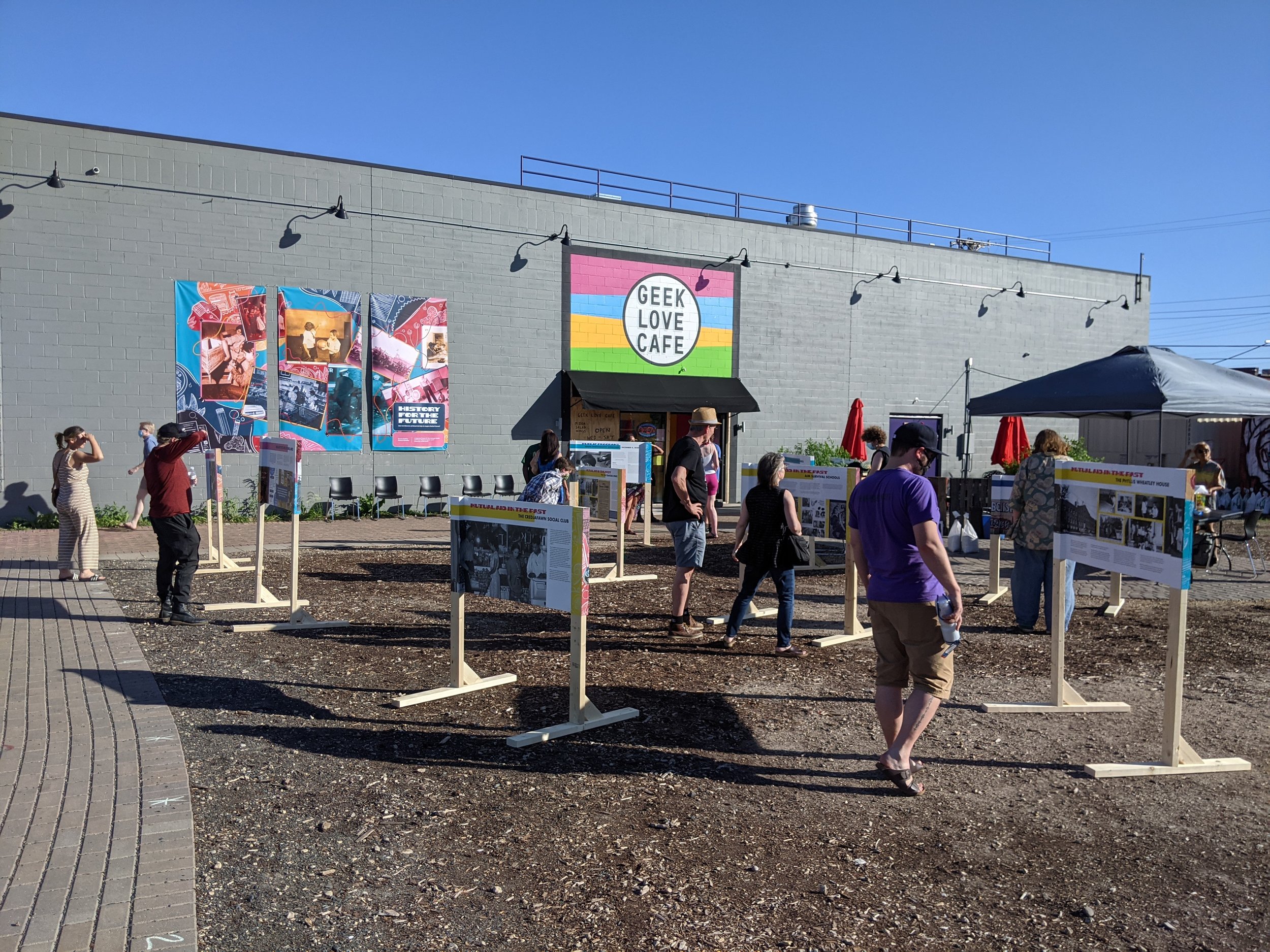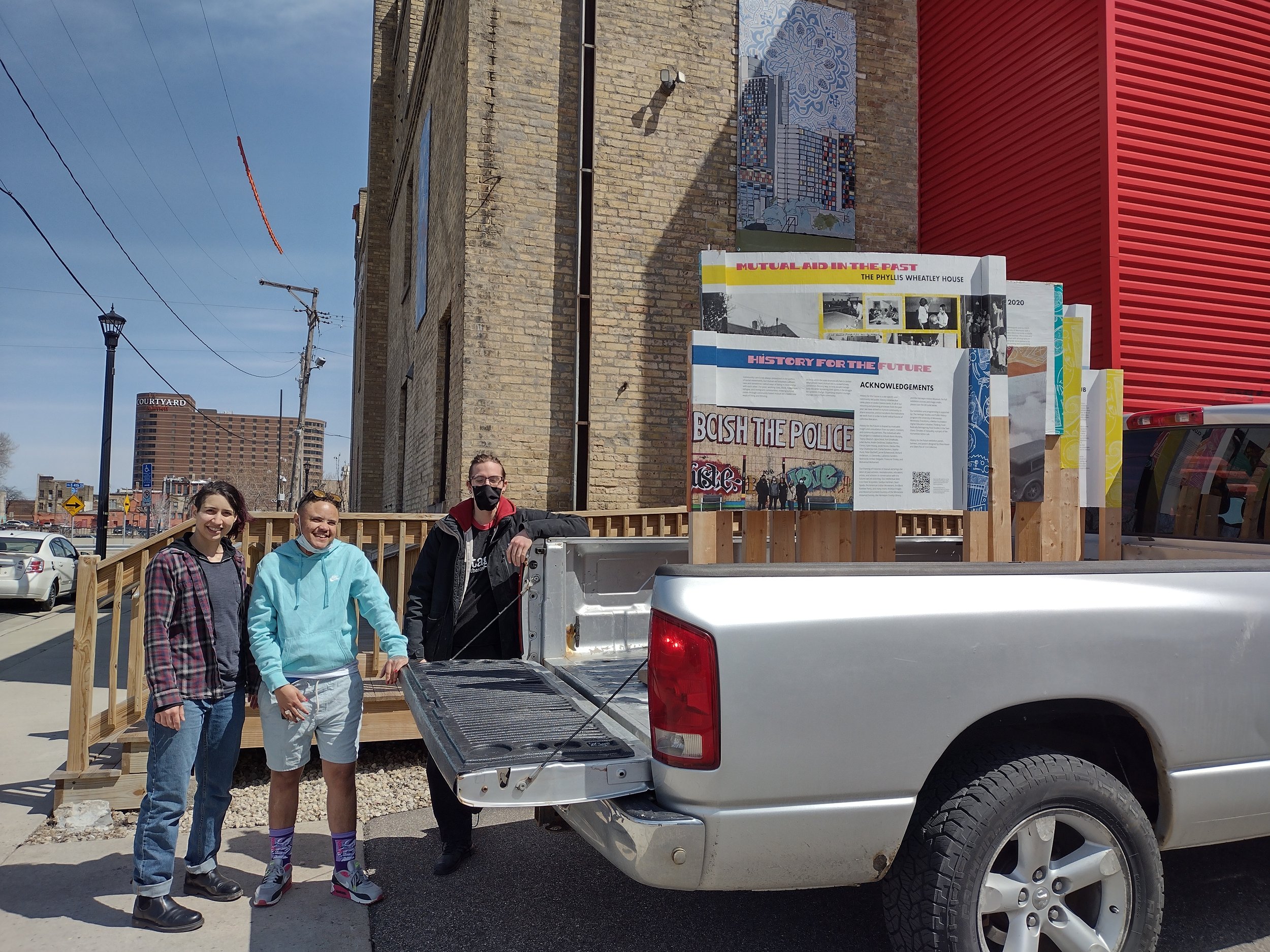ABOUT
History for the Future emerged from efforts to situate present day mutual aid organizing in the Twin Cities into longer histories of community care, political activism, and the ongoing work of building radical futures.
During the uprisings in the wake of the murder of George Floyd in the midst of escalating economic impacts of COVID-19, a blossoming of mutual aid practices, networks, and visions grew across the Twin Cities to meet immediate housing, food, and healthcare needs. As graduate students, the idea to initiate a public history project on local histories of mutual aid emerged during our personal engagements with the abundance of community organizing during the summer of 2020, and over the following years.
Acoma Gaither (she/her) is a public historian working as a steward for loud history. As a curator and public historian of color, she hopes to challenge institutional norms that stifle community representation. Acoma is currently a public program associate at the Minnesota Historical Society helping to create powerful engagement with history to build curiosity and foster more inclusive, empathetic and informed society. In 2021 she graduated with a masters in Heritage Studies and Public History at the University of Minnesota. She’s been involved with several projects at the Minnesota Historical Society including History of Race and Policing in Minnesota, Historic Fort Snelling, and Restorative Justice Round Circles. She has also worked as a Protest and Preservation Collections Care fellow with the Midwest Art Conservation Center and the George Floyd Global Memorial. Acoma’s academic interests include Black Cultural Studies, Digital Humanities, Youth Development, and Curatorial Studies. Outside of her scholarly life, Acoma enjoys roller skating, reading horror novels, and playing with her cat.
Acoma Gaither
Public Historian
Pronouns: she/her
E: iamacoma@yahoo.com
Andrea Manolov (she/her) is exploring radical modes of writing histories and visioning futures. She is a Minneapolis based public historian who loves to collaborate at the intersection of arts, media, and community-centered storytelling. Her experience includes co-directing History for the Future, a community-based public history exhibition and public program series which explores the history of mutual aid in the Twin Cities. Andrea is also the creator of the Interstate Digital Archive at Mixed Blood Theatre, a place-based archive which documents queer and trans Asian American space-making in the Cedar Riverside neighborhood. Andrea leads digital media production for Minnesota Transform, a Mellon Foundation grant initiative for racial justice in higher education. She holds a Masters in Heritage Studies and Public History from the University of Minnesota.
Andrea Manolov
Public Historian
Pronouns: she/her
E: andrea.mlov@gmail.com

Acknowledgements
History for the Future is a site-specific and community led public history initiative that takes place on stolen Dakota lands. As public historians we are committed to transforming the field we are trained in, positioning our practices of history within the ongoing movements in resistance to the logics of dispossession and racial capitalism. In all of our visioning and planning processes from the past year, we have strived to nurture community, to share resources, and to transform the institutions we work from in order to build radical futures of collective liberation.
History for the Future is shaped by invaluable insight and consultation from our peers and mentors at the University of Minnesota. The individuals who this project is indebted to include Kevin Murphy, Tracey Deutsch, Jigna Desai, Kari Smalkoski, Juliet Burba, Andre Deckrow, Esteban Perez-Cortez, Kylie Hoang, Jacob Noble, Denise Pike, Srija Chatterjea-Sen, Clarke Sanders, Sophie Hunt, Peter Rachleff, Jamie Schwesnedl, Richard Anderson, Liz Sevcenko, Amber Delgado, Treasure Tinsley, and Mohamud Mohamed.
Our community partners include: Clarke Sanders Hustle Marketing; Hennepin History Museum; East Side Freedom Library; Food Justice Educator LaDonna Redmond; Moon Palace Books; Mixed Blood Theatre. Our exhibition and programming is supported by: The University of Minnesota Heritage Studies and Public History; Minnesota Transform, a Mellon Foundation Higher Education Initiative; Thinking Food: Radically Reimagining Food Studies in the Twin Cities; Climates of Inequality, a project of the Humanities Action Lab.








